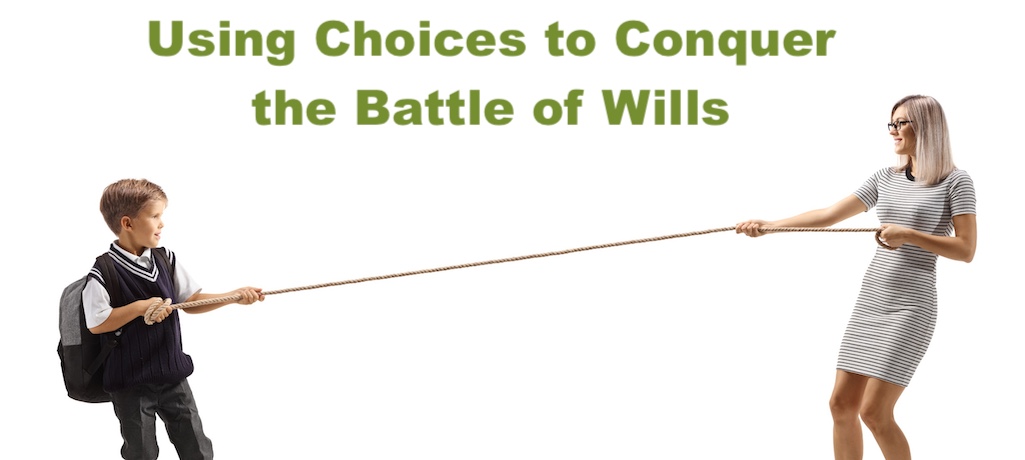
Most parents can think of a time (or many times) when they found themselves in a power struggle with their child or teen. One of the best ways to reduce these power struggles is to use choices with limits. Choices provide a sense of shared control and reduce the urge for children to grasp power wherever they can get it. We can help you conquer the battle of wills.
There are a few critical guidelines to ensure choices work effectively:
1. Only give two choices you can live with.
Do you want broccoli or carrots? Not: Do you want chocolate cake for breakfast or fruit?
2. Avoid open-ended choices.
There must be only two predetermined options: Not: What do you want for dinner? Not: “What vegetable do you want?” If the child does not choose, then you choose for him/her: “OK, carrots it is!”
3. There is always an implied or unspoken request that is not a choice.
You are requesting the child eat a vegetable. The choice is which one.
4. Practice giving tow choices throughout the day when things are going well.
Make lots of choice “deposits” so you may later make a “withdrawal:” Would you like milk or water? Red cup or blue cup? Straw or no straw? Ice or no ice?
5. Keep the choices age and developmentally-appropriate.
Children do not choose when lunchtime is. They only choose if they want carrots or broccoli.
6. Choices are not threats.
Don’t say: Do you want to eat your carrots or go to timeout? Don’t say: “Do you want to do what I say or be grounded?”
7. Give two options for all things that do not cause a problem for you.
Even if the choice seems small…a little shared control goes a long way. Here are some examples: Would like to put on your PJ’s first or brush your teeth first? Would you like to set the table or take out the trash? Are you going to mow the lawn or pay someone to do it? Would you like your nightlight on or off? Radio on or off? Bedtime story or song? Blanket or sheet? Would you like to take a bath or shower? Red spoon or blue spoon? Before you take the family car, do you want to pay for the insurance deductible in one lump sum or three payments? Cash or check?
8. Have fun with it.
You will be surprised by how quickly giving two choices becomes just the way you communicate with your child (and maybe others in your life, too).
I have to admit I am always surprised how well this works, especially with the most strong-willed kids. And fortunately, if you forget to give a choice and find yourself in a battle of wills, you can always stop mid-battle and give a choice. Even more important than reducing power struggles, choices prepare kids for the real world. It teaches them to make decisions in their own lives and own the consequences (good or bad). Giving kids choices also sends the message that you believe they are capable of making good decisions for themselves – that’s a powerful message!
©2022 Individual Matters. All rights reserved. Feel free to republish so long as credit is given.

 Why Do Therapists Need to Understand Neurodevelopment?
Why Do Therapists Need to Understand Neurodevelopment?